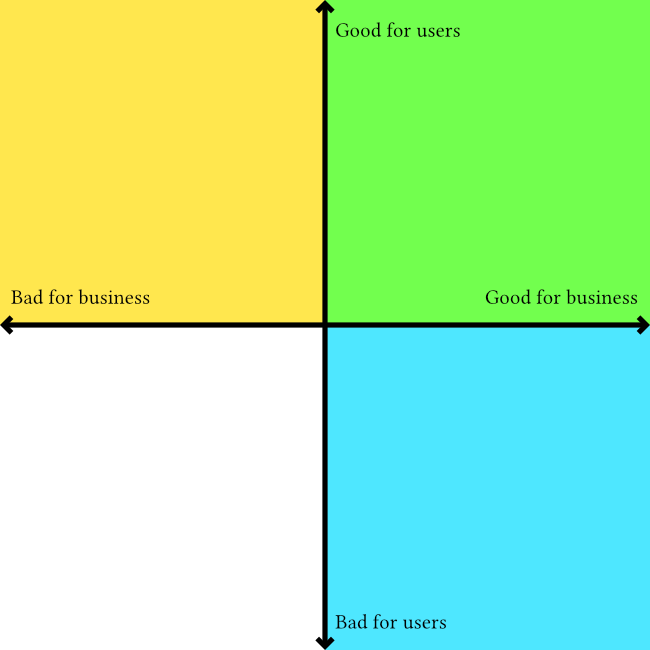Feedback types: Is this a thing? / challenging perspectives / general opinions
Here’s an outline which I originally posted as a tweet thread but would like to flesh out into a fill article with images like the attached one to illustrate the “zones” that people may/may not realise they are acting in when they say stuff like “what’s good for the user is good for the business”
I am writing this because I’ve published a few things now which say that empathy and “human centeredness” in commercial design, particularly UX design/research, are theatrical and not compatible with capitalism if done deliberately. That means they can be true as a side-effect, or by individuals acting under the radar of their employers. It has become common to hear the good for the user = good for the business response - and I want to write something that demonstrates how it is an incomplete sentence, and any way to add the necessary information to make it true results in the speaker admitting they are not acting in the interests of users or humans.
Here’s the basic outline so far:
What’s good for the User
“What’s good for the user is good for the business” is a common response I get to my UX critique. When I try to understand the thinking behind that response I come up with two possible conclusions:
Conclusion 1: They are ignoring the underlying product and speaking exclusively about the things between the product and a person. They are saying that making anything easy to use, intuitive, pleasant, makes a happy user and a happy user is good for business.
This type of “good for the user” is a business interest that values engagement over ethics. It justifies one-click purchases of crypto shitcoins, free drinks at a casino, and self-lighting cigarettes. https://patents.google.com/patent/US1327139
Conclusion 2: They are speaking exclusively about the underlying product and the purposes it was created to serve. They say a good product will benefit the business. But this means they are making a judgement call on what makes a product “good”.
This type of “good for the user” is complicated because it is a combination of objective and subjective consideration of each product individually. It is design in its least reductive form because the creation of something good is the same with or without business interests. A designer shouldn’t use blanket statements agnostic to the design subject. “what is good for the user…” ignores cigarette packet health warnings and poker machine helpline stickers there because of enforced regulation, not because of a business paying designers to create them.
It’s about being aware of the context, intent, and whose interests are being served. It means cutting implied empathy for people if it is bullshit.
If we look at this cartesian plane diagram we can see the blue and green quadrants that corporate product design operates in. The green being where the “good for user, good for business” idea exists, and the yellow representing the area that the idea ignores, dismisses, etc



Firstly, if I can interest an academic with my writing, that’s definitely a win for me. Thanks for this considered feedback!
Ok:
Thanks for highlighting this. I often wonder how necessary it is to qualify my position with some indication of who the fuck I am/think I am.
As for the kinds of UX critique that get’s this response, I’ve tweeted quite a bit about a UX posture that doesn’t match the commercial reality. One particular post that went viral (for someone like me) was this one: https://nitter.net/fasterandworse/status/1528748399528398851#m and my recent “The Aura of Care” article which got some attention on Medium after the UX Collective published it and modified my title to “The Fake Aura of Care in UX” with this comment particularly being the one that pushed me to think deeper about this mantra:
This is a great provocation which adds a whole other dimension to the ways the statement can be interpreted. It’s clear that most members of expertise-based communities rarely reflect on these things about the businesses that pay them. This doesn’t matter for a community of graphic designers discussing and debating typography and colour theory - but it becomes a problem when the community develops a brand of care and empathy.
The “good for the business” is good to explore further. I said they could be making a judgement call on what makes a product good but it’s really about the business behind the product because any commercial design is marketing.
haha, perfect! You caught me trying to sound smart. I think I googled “what is a four quadrant x/y axis chart called?”
Good point.
Thanks again for the great feedback. It is appreciated. I’m still the only one to post anything on here but it’s already proven to be a valuable forum.
I don’t promise to be a good academic 😂 but I’m glad my comments were helpful 😊
It’s mainly that I found it hard to place where your experience was coming from without a concrete idea of your job experience (e.g., the article reads a bit differently coming from a front end developer vs a UX consultant, etc.)
That said, I didn’t at any point while reading think “who the fuck does this guy think he is”—your expertise and knowledge come through really clearly just from the quality of your ideas.
I gave this a read and thoroughly enjoyed it! Really got me thinking about what’d good for the user not being the same as what the user enjoys the most. A videogame example: grinding for loot on World of Warcraft is worse for you than doing chores, but it is easier. I wonder if software that’s difficult to use for ethical reasons is always going to be at a disadvantage in the market. Probably not, because absolutes are rarely true, but the conditions for the sucess of ethical software over easy to use software are interesting to think about.
Honestly I think the forum a great idea, also an actual antithesis to the site the name is a pun on—the more positivity on the net the better. Thanks for making it!
Now I just need to figure out what I can get away with posting myself without compromising my anonymity. My academic writing is generally meant for publication so that’s out, but perhaps I can get away with some of my fiction writing for the D&D games I run—height of sophistication I know 😏
I’ve never thought about it inside a game like this. It adds perspective to the rise of casual gaming on smart phones. Like the runner games and driving games where the action happens on rails so you only have to worry about parts of the controls, like turning or jumping. I’ve not played WoW but I did play Animal Crossing when it came out on the GC and it was basically a doing chores game where the reward for doing stuff is your own satisfaction. It wasn’t online and despite some memory card sharing capabilities it was a solitary experience.
This is what I try to remind myself whenever I write about these things. If I spot myself hinging an argument on a dichotomy I make sure I think and understand the dichotomy away. It usually results in a better insight and a stronger argument.
Animal Crossing must have been a hell of a game to pitch into production. It’s like the Seinfeld of video games, a game about nothing and it was addictive
My CV summary - I’m a front end dev/design veteran. I’ve been doing it since about '97 when we were called web designers and did the photoshop and the code. I’ve worked in corporate, agency, and startups. I am Australian but have been lucky to work a few years in Japan and now based in France. I’ve managed front end dev teams and IA/UX teams. I’m pretty much unemployable these days because I was put off by the rise of client-side rendered JS web apps and lagged behind in adopting the skills - plus I haven’t really hid my identity in my writing about the industry, so I don’t land many interviews any more. 😅
Credit to @self for the idea and getting it started. Please post your fiction writing! I’d love to see your creative process and give any feedback I can. Also for your academic work, you don’t have to post the writing - I think this can be a good space for spitballing ideas too. “Is this a thing?” has become my favourite question.
Sorry my reply’s a little late, it’s been a busy couple of weeks!
Animal Crossing/Super-stimuli
I think part of the reason Animal Crossing is so much more of an enticing environment to do chores in than real life is because progress is so much more salient within it. Even without a explicit progress bar filling up every time you do a chore, every interaction with the world in Animal Crossing is more vibrant and quicker to resolve than in real life. Sort of “supernormal stimuli” for completing chores if that makes sense?
I think anything with progress is likely to have the same addictive value (idle games for example) which makes me wonder.
Experience
No wonder your expertise was clear: you’ve got a lot of it! Hopefully the upside of being frank with your views is that the interviews you do land are with companies that are more likely to listen to you. (I suggest, naively.)
My web dev experience is almost entirely with the client side JS frameworks 😅 I built my first web app in 2014 with AngularJS and Flask, which was definitely a mistake. But I learned a lot quite quickly from that mess and the major web app I built was almost entirely client-side with Firebase for the back-end.
I’m not a professional web developer though, the app I built was for some academic project. Its turned out to be a really useful skillset to have in my back pocket, and definitely gave me an appreciation for software development that I think a lot of academics don’t have. The number of academics that write code without version control is terrifying!
Posting Fiction
I’ve been thinking about what to post, and I have some ideas.
I actually have a homebrew D&D setting that I think the crowd on this board is is the best audience I could hope for. All the societies in it are satirical takes on various philosophical stances including some of the groups discussed on the other awful.systems boards.
I just need to find enough time to sit down, polish up my notes up a little so there’s a hope other people can understand them!
Thanks for this. One thing I am finding is that technical web expertise has a short half-life where around 6 years is peak and beyond that starts to have the opposite effect. Baggage and all that. Always sticks with me this one time on the orange site I saw an argument about web accessibility and a young’in dismissed an older, more experienced poster as an “a list aparter”
Honestly, we have two posts on here now and both have had so much more feedback and observation than I expected. I say you should go for it.
Only thing is now I feel guilty because I haven’t followed up on my post yet. I need to write a draft with all the great feedback in mind.